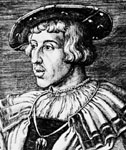Ferdinand I.
|
 |
born March 10, 1503, Alcalá de Henares, Spain
died July 25, 1564, Vienna, Habsburg domain [now in Austria]
Holy Roman emperor (1558–64) and king of Bohemia and Hungary from 1526, who, with his Peace of Augsburg (1555), concluded the era of religious strife in Germany following the rise of Lutheranism by recognizing the right of territorial princes to determine the religion of their subjects. He also converted the elected crowns of Bohemia and Hungary into hereditary possessions of the house of Habsburg.
The younger brother of the Holy Roman emperor Charles V, Ferdinand was granted Austria, with the regency of both the Habsburg German lands and Württemberg. For more than three decades he was Charles's deputy in German affairs, representing him at imperial diets and serving as president of the Reichsregiment (imperial governmental council). Initially he followed Charles's policies almost unquestioningly. Hostile toward Protestantism, he bore some responsibility for the Lutheran secession from the Diet of Speyer (1529), and, after he had lost Württemberg to the Lutheran landgrave Philip the Magnanimous of Hesse (1534), he helped the emperor defeat the Protestant Schmalkaldic League in 1546–47. Aggrieved, however, at Charles's refusal to reinstate him in recaptured Württemberg and at the emperor's attempts to ensure the succession of his son Philip (the future Philip II. (1527-1598) of Spain) to the imperial crown, Ferdinand began to take a more independent stand. The imperial heir since 1531, he was not finally placated until Charles agreed in 1553 to exclude Philip from the German succession, which then passed to Ferdinand's son, the future Maximilian II. (1527-1576). On the Protestant issue, Ferdinand, unlike Charles, eventually became convinced of the need for a compromise. In 1552 he negotiated the Treaty of Passau with the Lutheran elector Maurice of Saxony (1521-1553), who was at war with the emperor; and in 1555 he signed the Peace of Augsburg, which, with few interruptions, brought half a century of peace to Germany's warring religious factions.
In foreign affairs Ferdinand was no less successful. In 1526, on the death of his brother-in-law, King Louis II of Bohemia and Hungary, Ferdinand claimed both domains. He took possession of Bohemia without difficulty but faced a rival claimant, János Zápolya, in Hungary. Each was elected by a rival faction, and Hungary remained divided among Ferdinand, Zápolya, and the Ottoman Empire. In 1538, by the Peace of Nagyvárad (German: Grosswardein), Ferdinand became Zápolya's successor, but he was unable to enforce the agreement in his lifetime. The Ottoman Empire almost continually threatened Europe during Ferdinand's reign. The Turks failed to take Vienna in 1529 but threatened Austria again in 1532 and 1541. After repeated and mostly futile pleas for assistance from the German princes, Ferdinand finally reestablished an uneasy peace in 1562, when he agreed to pay tribute to the Ottoman sultan for Austria's share of Hungary.
Ferdinand took over Charles's imperial functions in 1555 and was elected emperor in 1558 after his brother's abdication. With his accession, the Habsburg domains became separated into more easily governable Austrian and Spanish parts, with Spain going to Philip and Germany to Ferdinand. The new emperor centralized his administration and, though only with limited success, sought to revive Roman Catholicism in his lands. His eldest son, Maximilian, succeeded him in 1564. Though always overshadowed by his brother Charles V, Ferdinand had become one of the most successful Habsburg rulers of the 16th century, increasing the hereditary possessions of the Austrian Habsburgs significantly and restoring peace to the empire after decades of religious warfare.
Copyright © 1994-2002 Encyclopædia Britannica, Inc.
![]()
Sources
- Encylopedia Britannica 2002, Expanded Edition DVD
Web





